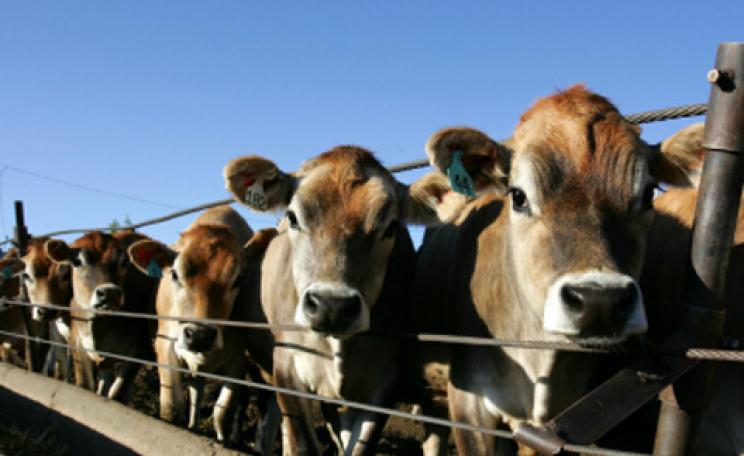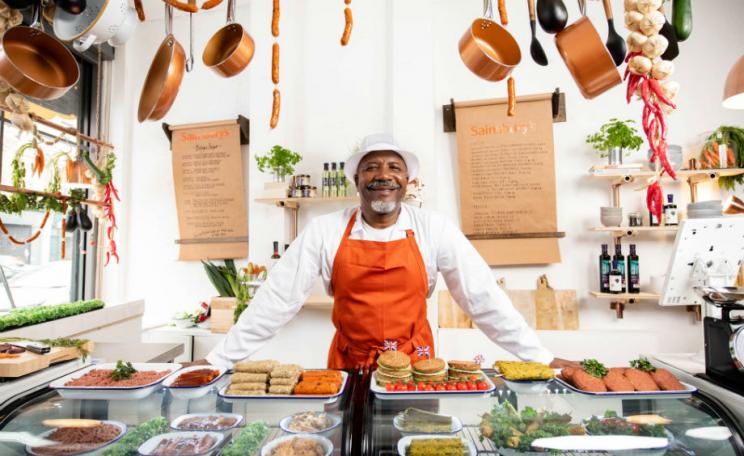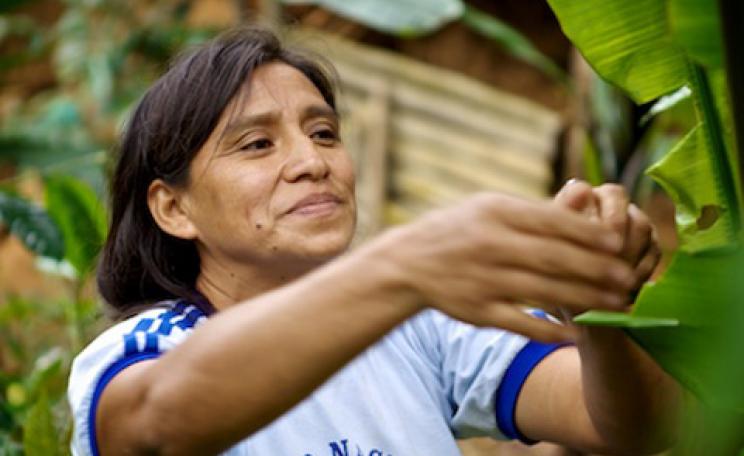When you are next out in Soho why not try eating at the ‘fast casual' restaurant Otarian? While munching on a vegetarian lasagne or an apple crumble, you can ponder the significance of the little numbers attached to your meal. Health food? Yes, perhaps - but of a different sort. Rather than low-cal, this is low-carbon food, and the motivation behind it is not so much your health or mine, but the planet's.
‘There are quantifiable and measurable benefits to eating at Otarian,' says founder and CEO Radhika Oswal. These benefits amount, more precisely, to 2.3kg of carbon savings when eating one of Otarian's combo meals. For an average £8.95 meal you can save the CO2 equivalent of four central London black-cab journeys.
So the pleas - from the likes of Lord Stern, R.K. Pachauri and Paul McCartney - to eat less meat have not gone unanswered! ‘Everybody thinks, "Sustainability? What's that got to do with me?" - but what we've done is empower people. You don't have to spend more, and you can get it quickly,' she says.
 Accidental beginnings
Accidental beginnings
The idea behind Otarian came about haphazardly. Lacking a decent vegetarian place to eat on a trip to London from Perth, Australia, Radhika jokingly suggested to her husband that they start a chain - 'and if you are a financially well-endowed girl like me, you can,' she says.
After three years of planning, with $1 million spent in development, starting with 14 chefs, an initial list of 600 recipes, shortened down through tastings with 500 respondents, Radhika speaks with passion, confidence and knowledge on many complicated food-related subjects. She is clearly the driving force behind this restaurant chain. But her love-affair with food, perhaps strangely, extends only so far. ‘I'm one of the worst cooks in the world,' she says.
Oswal's global chain of ‘concept' vegetarian fast-food restaurants unwraps the complexities of ‘farm-to-fork' carbon counting and repackages them to meet time-starved, guilt-tripped urbanites where they are.
Trouble is, Otarian's interpretation of ‘ecotarianism', or eating with sustainability in mind, has very lofty ambitions for such a narrow focus. Limiting your meat intake is wise, and the more restaurants like Otarian there are, the more likely that vegetarian sceptics will come round to the fact that a tasty bite out doesn't have to involve eating meat. But Otarian's is a sustainable cuisine lacking a sense of place, devoid of seasons and completely dismissive of the benefits of organic agriculture.
The meat of the matter
I went to a tasting with Geetie Singh, whose Soil Association-certified gastro pub The Duke of Cambridge has been a beacon for many groping with complex food sustainability issues, and who received an MBE for services to the organic pub trade last year. She brought with her a healthy dose of scepticism. As the dishes arrived at the table, the conversation quickly turned serious.
We started with a tasty roasted tomato soup. Aiming for the lowest carbon footprint, you would think local, in-season tomatoes would have been used. But the restaurant found sourcing them from Spain (in summer) or Holland (in winter) to be less carbon-intensive than tomatoes grown in the UK, because of the comparative energy use. Fair enough, but while the seasons change, Otarian's menu doesn't. Only in foregoing seasonality do they contemplate a supply chain that presumes a continuous, year-round supply of ingredients.
 We then tucked into three veggie burgers: an Indian chutney, a field mushroom and a Tex Mex. Eating any one of these will save you around a kilogram of carbon. But, we wondered, compared to what? Would it be a burger from grass-fed, organically reared cattle, or an industrially produced Big Mac? Had they considered land under rotational grazing? What about farming on difficult to exploit land that can't be used for other crops?
We then tucked into three veggie burgers: an Indian chutney, a field mushroom and a Tex Mex. Eating any one of these will save you around a kilogram of carbon. But, we wondered, compared to what? Would it be a burger from grass-fed, organically reared cattle, or an industrially produced Big Mac? Had they considered land under rotational grazing? What about farming on difficult to exploit land that can't be used for other crops?
Otarian hired carbon-reduction consultancy Sustain to wade through various data streams to come up with a carbon calculation for an average burger. The calculations are mind-numbing: the representative sample includes some grass-fed, some grain-fed, with variations in emissions rates from UK beef (82 per cent of beef consumed in this country comes from the UK) and Brazilian beef (with a much higher emissions) to create a hypothetical restaurant that ‘hasn't gone to great lengths to source sustainably or locally,' says Matt Fishwick, a Sustain consultant.
It doesn't end there. Sustain carried out the product carbon-footprinting for the 30 meals on the menu. All 200 ingredients have been analysed in painstaking detail, revealing the cost of manufacturing, packing, transporting, cooking and disposal of each. Fishwick says they relied on data from DEFRA and specifications from the widely accepted footprinting standard PAS 2050.
As a vegetarian restaurant, Otarian's aim is to show how not to eat meat, but it must be said that not all burgers are created equal. Being chained to the carbon concept limits its sourcing decisions. For example, it excluded organic because, while it would cut out the CO2 from synthetic fertilisers, it concluded the ‘generally accepted' lower yields from organics would mean higher overall emissions.
Do they worry about glossing over these differences? ‘It's better to have a number out there than no number at all,' says Claire Pulker, manager of corporate planning, who helped Oswal formulate Otarian's message.
 Taste the difference
Taste the difference
Geetie and I made our way through wraps and flatbreads, lasagna and noodle dishes, biryanis, beetroot and feta salad, sweet potato chips and three types of pudding.
Mouths full, we listened to a recital of the lengths to which Otarian has gone to cut down not only the carbon footprint of the food, but also of the whole restaurant itself. We learned that it has a green-energy tariff, has a no-air-freight policy, that all food waste is composted and waste recycled. The disposable crockery is compostable: the water cups come in PLA plastic, dishes are made from bagassse; Otarian is also the first to use a fully compostable soup container and lid by Vegware.
As food stories go, the connection you get to your food involves a kilogram.
 The delicious panna cotta with berry compote had another twist. They got around not using egg (another of Oswal's no-nos) and gelatine (due to animal derivatives) to make perfect consistency and taste using Agar, a seaweed.
The delicious panna cotta with berry compote had another twist. They got around not using egg (another of Oswal's no-nos) and gelatine (due to animal derivatives) to make perfect consistency and taste using Agar, a seaweed.
One strange point is that, as a lacto-vegetarian restaurant, it uses milk sourced from a Suffolk dairy - ‘as close to Hindu beliefs as you can get' - echoing Oswal's beliefs. Geetie asked what happens with the young from the cows: are they slaughtered? Claire Pulker didn't know, but later I asked Matt Fishwick at Sustain. He revealed that they ‘try to reduce the male cattle born' through a special process during the insemination process, adding that 'male calves and female cows past milking life are allowed to live on in the field until they die naturally'. But this dairy is an exception to the low-carbon rule, as these practices give the dairy higher overall carbon emissions.
Food for thought
I left wondering how much knowing a food's carbon journey enhances the enjoyment of eating it. The answer is not much. All the dishes on the menu, bar the biryani and the vegan chocolate treat, which fell short of a chocolate lover's dream, are very good. I would definitely eat there again, yet I kept asking myself: do I need to or do I want to?
Otarian London restaurants are on Shaftesbury Avenue and Wardour Street in Soho.
Matilda Lee is the Ecologist's Community Affairs Editor
| READ MORE... | |
 |
INVESTIGATION A meaty issue Our excessive appetite for meat is taking a heavy toll on the planet, but as Simon Fairlie explains, the arguments used to depict omnivores as environmental super-villains are far too simplistic. |
 |
INVESTIGATION Eating insects: a solution to the meat problem? The world's demand for protein will continue to rise, even as the environmental impacts of meat production become clearer. Could turning to commonly eaten insect species be the answer? |
 |
INVESTIGATION Lab grown meat: a low-fat, low-carbon, cruelty-free future? The technology isn't fully developed yet, but when meat really can be grown in a lab it's going to turn all our arguments about carnivorous diets on their heads... |
 |
GREEN LIVING Beef: an interactive buyer's guide Do you know your clod from your foreshin? Learn more about rare, cheap cuts of beef (and why local and well-hung meat is best) in this interactive guide from chef Darina Allen |
 |
HOW TO MAKE A DIFFERENCE How to campaign for better food Concerned about the state of your food? Here are some ways to tackle the problem at root - from community gardens to animal welfare |








